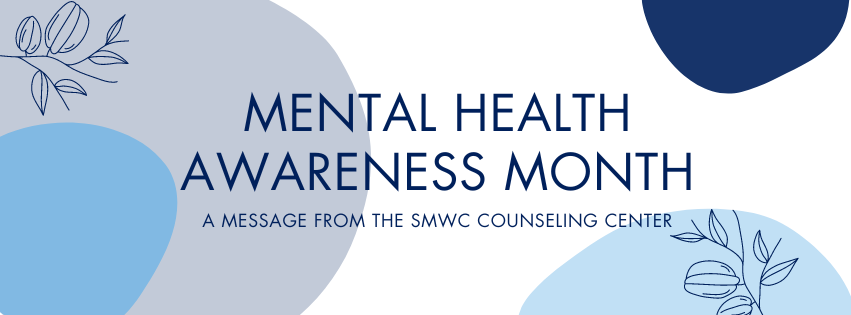
by The SMWC Counseling Center Staff
1. Make yourself a priority.
When making your mental health a priority – YOU have to be the priority! This can mean many things, such as engaging in meaningful self-care, practicing a balanced lifestyle and ensuring you get enough sleep are just a few ways to put your functioning first. Making yourself a priority is highly individual – try making a list of three things you can do to put yourself first.
2. Take a social media break.
Social media is an effective distraction – often too effective. Many of us get caught in the doom-scroll and forget the world around us. Building in an hour or more of your day dedicated to staying off social media can help boost awareness, mindfulness, connectivity and increase quality of sleep. It can also decrease feelings of disengagement and comparison of self to a curated image.
3. Practice meditation and/or mindfulness.
Much research has shown the numerous positive benefits that meditation and mindfulness provide. Even as little as five minutes per day of meditation or mindfulness can boost feelings of calm, reduce anxiety, increase self-awareness and reduce memory loss. If you struggle to meditate, participating in mindfulness activities such as coloring may provide similar benefits.
4. Avoid increased or heavy substance use.
A common thing for many adults is to enjoy an alcoholic beverage after a stressful day. However, alcohol and other substance use can lower our functioning and increase negative symptoms of mental and emotional health. It’s important to always moderate use and reach out for help if you feel you may be over-consuming.
5. Go outside.
A great practice to build alongside your social media breaks – going outside and engaging with nature is clinically proven to reduce stress. Participating in outdoor activities has also shown to cultivate feelings of joy and senses of stewardship in people. Even if you are not near a woods or park, you can still engage with nature through plants and spending some time outside every day.
6. Cultivate connections.
Even introverts need social time! Humans are social creatures and feelings of belongingness have shown to increase mental and emotional resiliency. Meaningful time with friends, family or other groups are a great way to connect with your community. If you’re looking to build your social circle, look for community based classes, groups and sports to participate in.
7. Move your body.
Exercise is another clinically proven method of improving mental and emotional health. However, we often get caught up in what exercise is. Movement of any kind can provide significant benefits to mental health, so find something that you enjoy – cycling, running, dance, yoga, tennis, walking, hiking – and enjoy it frequently!
8. Explore playfulness.
Even adults need recess! Play is an important factor in reducing stress, increasing social connections and stimulating creativity. Play can include social interactions, participating in hobbies or interest and engaging in games and challenges. Make sure you’re incorporating joy and laughter into your play.
9. Express gratitude daily.
Expressing gratitude does not mean ignoring the negative or difficult things in our life. It is important, through difficulty, to recognize the things that continue to provide light and hope. Keeping notes in your phone of three things that you’re grateful for each day is an excellent habit for finding joy, hope and practicing mindfulness.
10. Reach out for help when needed.
Everyone will go through periods of life that are difficult, and many will experience negative mental health symptoms. Reaching out for help during these times is important – whether it is to a family member, friend, clergy or mental health professional. Learn about employee assistant programs, insurance coverage or community mental health agencies in your area that can provide additional support if needed. Knowing how to ask for and access help can lift some of the burden and intensity of those negative experiences.

Melissa Grinslade is a Licensed Clinical Social Worker (LCSW). Melissa received her master’s degree in social work from Indiana University and her bachelor’s degree in psychology from Indiana University. Melissa’s professional interests include eating disorder treatment, early childhood trauma and trauma work, personality disorders and affirming care. She enjoys incorporating art as therapy into the work that she does. In addition to therapy, Melissa is passionate about training and oversees training for master’s and bachelor-level students. She is dedicated to evidence-based treatment and developing innovative prevention and early intervention programming to address our emotional wellness needs. Her professional experience includes working within community mental health, residential treatment, partial hospitalization treatment, crisis assessment, college counseling and as a clinical director. Melissa has several certifications for yoga training, including Yoga for Mental Health, and uses her skills to develop yoga outreach experiences focusing on emotional wellness. In addition, she is part of a grants task force, writing grants to help fund innovative programming ideas.
In her free time, Melissa loves being a mom. You will most often find her spending time with her family. She enjoys traveling, camping and curling up with a book to read. In her personal and professional life, she encourages everyone to remember that those things that make us uncomfortable are our biggest opportunities for growth.

Sara Julian is a Licensed Clinical Social Worker (LCSW). Sara received her master’s degree in social work from Indiana State University and her bachelor’s degree in recreation and sports management with a concentration in recreation management and youth leadership from Indiana State University. Her experiences include working with individuals, children and families. Sara’s professional experiences include working in community mental health agencies as well as in a university counseling center. Sara’s professional interests include relationship issues, early childhood trauma and mood and anxiety disorders. Sara also leans into ecotherapy, which is a therapeutic approach that involves being in nature to promote mental health and wellness. Sara’s hope is to be able to create an ecotherapy program at Saint Mary-of-the-Woods College, which has already created an eco-friendly environment for all.
When Sara is not in the office, she loves to be out in nature or spending time with friends, family or many pets.

Emma Campbell ’13, ’21G, serves as the Mental Health Educator for MINDful College Connections at Saint Mary-of-the-Woods College. She earned her bachelor’s in psychology in 2013 and her master’s in Leadership Development in 2021 – both from Saint Mary-of-the-Woods College. As part of her master’s thesis, Emma’s research focused on student mental health symptom monitoring and risk assessment on small college campuses. Emma has worked in higher education for over eight years in both events and philanthropy. She is passionate about helping students build resiliency and improving their college experience through healthy coping skills.

2 Comments